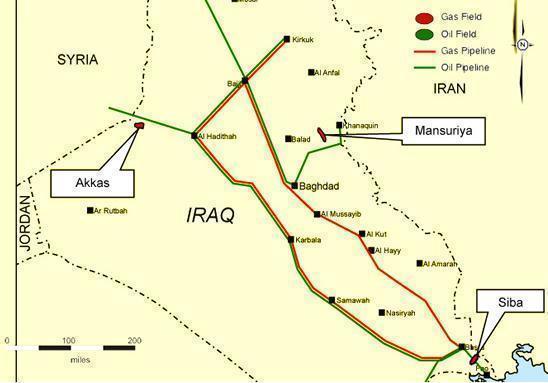With the U.S, Russia, and China all jostling for position in Iraq’s oil and gas industry both north and south, Iraq’s oil ministry last week reiterated its desire to have one or more foreign partners in the Mansuriya gas field.
Situated in Diyala province, close to the Iran border, Mansuriya is estimated to hold around 4.6 trillion cubic feet of natural gas, with plateau production projected at about 325 million standard cubic feet per day.

For the U.S., encouraging Iraq to optimise its gas flows so that it reduces its dependency for power from Iran is the key consideration.
For Russia, Rosneft essentially bought control of the semi-autonomous region of Kurdistan in northern Iraq in November 2017, so power in southern Iraq figuratively will complete the set.
Securing oil and gas contracts across all of Iraq will allow Russia to establish an unassailable political sway across the entire Shia crescent of power in the Middle East, stretching from Syria through Lebanon (by dint of Iran), Jordan, Iraq (also helped by Iran), Iran itself, and Yemen (via Iran). From this base, it can effectively challenge the U.S.’s vital oil, gas, and political ally in the region – Saudi Arabia. China, in the meantime, is operating to its own agenda in South Pars Phase 11 and its West Karoun holdings.
Iraq, like Turkey, is still – nominally at least – not committing to either the Russia or the U.S., preferring to play each off against the other for whatever they can get, and the same applies in microcosm to the field of Mansuriya.
Playing the game of pitting one side against the other for optimal gain, the Secretary General of the Iran-Iraq Joint Chamber, Seyed Hamid Hosseini, stated recently that Iran’s gas and electricity exports to Iraq are expected to reach US$5 billion by the end of the current Iranian calendar year, ending on 21 March 2020.
In the running at the time for both fields was Russia. So interested is it in securing gas sites in north and south Iraq, which it will eventually be able to move via its vast pipeline capabilities and networks, that even before the latest announcement on Mansuriya’s availability was made public, Gazprom Neft (the oil arm of Russia’s gas giant, Gazprom) communicated to Iraq’s current oil minister, Thamir Ghadhban, that it was ‘very interested’ in taking a role in the Mansuriya field.
No comments:
Post a Comment